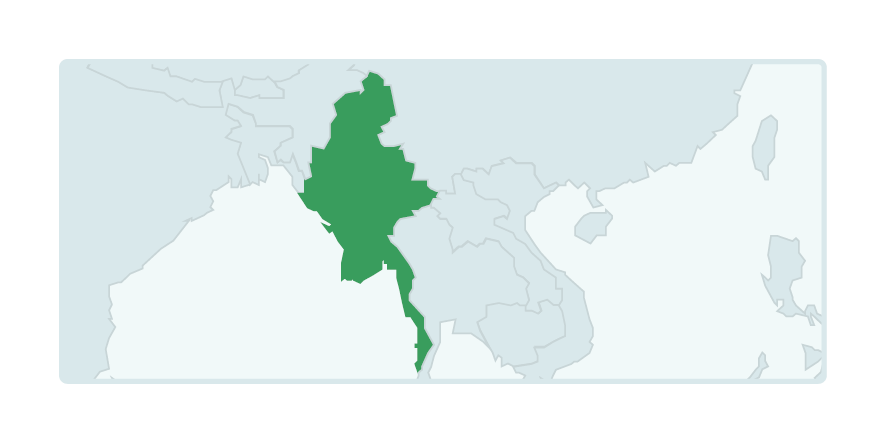To respond to food and nutrition insecurity, disrupted markets, and lack of job opportunities, the ALIVE-FNS project is addressing the immediate needs of vulnerable households and the mid & long term improvement of the selected value chains in 5 townships of Northern Chin State and the Ayeyarwaddy Region.
Implemented by a consortium — CIRAD, CORAD and Gret — the intervention aims to improve availability & access to safe, nutritious and diversified food for vulnerable producers and consumers in targeted areas and improve awareness of nutrition among value chains stakeholders.
Based on selection criteria, the action is supporting the improvement of konjac, vegetable and paddy value chains in 108 villages of the two regions.
Initial assessments have allowed the project to target more precisely the beneficiary households, assess their immediate needs and understand the economic, food security and nutrition situation in the area in order to adapt the proposed activities to the identified needs and local context.
She is 46 years old and has 4 family members. Her main livelihood activity is paddy farming, and during the farm breaks, she cultivates vegetables and breeds chicken and duck. Her eldest daughter is a high school student, and the youngest one is a primary school student. School fees depended on family income and in the rainy season, when she had to pay for school fees, it was the most difficult period to earn income as vegetables were not produced. She had to borrow money from others with interest. In 2021, she attended GRET technical courses on chemical-free vegetable farming.
From this training, she learnt the rainguard method in the rainy season, bio-input production and vegetable growing practices.
Based on learning, she invested in rain-guard and vegetable growing in the next rainy seasons. With the income generated, the school fees for her two daughters were no longer a problem as in previous years. In addition, the frequency of borrowing money has also decreased. Now the younger daughter is studying in (6th) grade and the eldest is continuing her education in Yangon, majoring in second-year chemistry.
In Khuangli village, all farmers grow vegetables for their livelihood and cultivate mostly Onion and Garlic for their daily income. But they do not cultivate much vegetables for their daily consumption such as Chinese cabbage, broccoli, zucchini, or cauliflower.
The interviewee is also growing vegetables and he said that thanks to seed kits supported by the ALIVE-FNS project, he can produce more vegetables for home consumption and also sold some extra ones to get income.
He also mentioned that some farmers can produce their own seeds and do not need to buy anymore from stores.
He does not use any chemical fertilizer in the farm where he grows the seed-kit varieties. He can then produce organic vegetables for home consumption. After eating organic vegetables, his family is healthier and can work more than before. They also have more varieties than before for their home diet.
After eating organic products, they know the benefits and they will try to use only organic fertilizer for producing for consumption.
The ALIVE-FNS project has achieved significant milestones in its mission to enhance food and nutrition security among vulnerable smallholder farmers and their communities. Through its comprehensive approach, the project has successfully reached over 23,800 unique beneficiaries across 119 villages in five townships, specifically 78 in Chin and 41 in the Delta regions.
One of the key accomplishments of the project is the provision of inputs to 1,749 smallholder farmers, which has been crucial in boosting their agricultural productivity. Additionally, the development of rural and agricultural infrastructures has directly and indirectly benefited 16,420 individuals through cash-for-work programs. The project has also established 416 agro-ecology demonstration plots, serving as practical learning sites for farmers to adopt sustainable agricultural practices.
Training and learning initiatives in agro-ecology have engaged 4,419 participants, equipping them with the knowledge and skills necessary for sustainable farming. Nutrition awareness training has been conducted for 13,493 participants, emphasizing the importance of a diversified and nutritious diet. Furthermore, the provision of seed kits has benefited 5,133 individuals, ensuring access to quality seeds for improved crop production.
The project has also made strides in post-harvest management and market access, supporting 73 producers, processors, and collectors. This support is vital for reducing post-harvest losses and enhancing the marketability of agricultural products.
Overall, the ALIVE-FNS project has demonstrated substantial progress in strengthening the resilience and inclusiveness of value chains in Myanmar. By focusing on input supply and production, the project has exceeded its targets, although it has faced challenges in post-harvest management and market access. Adjustments during the project period, such as boosting production through input provision and expanding infrastructure development projects to all villages, have been instrumental in achieving these results.
